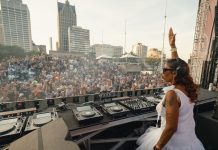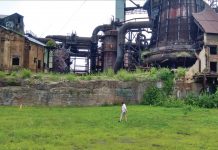
Hailing from a line of fashion icons and musical prodigies — her great grandfather invented the platform show and her grandmother was a New York opera star — Jesse Palter has creativity in her bones. The Detroit native, who studied music at the University of Michigan, moved to Los Angeles to work on her first album, but she’s returning to her roots to celebrate its release. On July 23, Palter will debut Paper Trail with a performance by Palter at The Magic Bag in Ferndale.
The autobiographical album is 10 tracks long. The jazz and pop songstress worked with studio musicians that have assisted artists like David Bowie, Pearl Jam, and Fiona Apple to complete the project. Although she’s the first pop artist to sign to Artistry Music, Palter brings a rawness and vulnerability that is anything but cookie cutter. Ahead of her album release show, she spoke with Hour Detroit about creating the record and why she wanted to come back home to celebrate its debut.
Hour Detroit: This album clearly didn’t happen overnight. What was the process of making your first record like?
Jesse Palter: It’s been such a long time coming. I was signed at the end of 2016, and in 2017, I just completely threw myself into creating this album. It started out with little baby demo’s that were usually just me and a guitar or a piano. I wrote so much music, and it was important to narrow it down to songs that made sense and told a cohesive story from start to finish. It was several months of working with these amazing musicians, people I had always dreamt of playing with. I had “pinch me” moments every single day. To be so hands on with the process and see it come to life is so magical for me.
How did working with those studio musicians help influence your creativity and the direction of the album?
I wanted these musicians to bring their own flavor to the skeleton of the song. You get in the room with these musicians and you have an outline, but you’re really just throwing mud on the wall and seeing what sticks. These guys really are just machines. It made the process a lot smoother.
How did it feel to work on something that you personally wrote as opposed to recording something that was given to you?
Writing songs is the part of music making that I feel the most fulfilled in. I love it all, but there’s this magical thing of like, “I just created this out of thin air.” I grew up singing other people’s music to keep the lights on and the bills paid, but it was always about getting to the point where I could do my own thing.
A lot of your music is autobiographical. What specific moments have inspired your songwriting?
“Goodbye My Friend” was actually written about a friend of mine who is an alcoholic. I had this very vivid dream that he died, and I remember waking up and having to check myself because it felt so real. As I was about to record the song, my aunt took her own life. It was the day I signed my record deal, and this incredible moment was overshadowed by something absolutely horrific. I was able to channel all this energy into recording this song and you can hear my voice crack towards the end because I was crying. I wanted to re-record it, but my producer said that we should keep it.
Why did you want to come home to celebrate the album’s release?
There must be something in the water around here. When people hear me sing and they say, “Where did you learn to sing with so much soul?” I tell them, “I’m from Detroit,” and that’s all you need to say. When I first started singing in Eastern Market, I was just this little Jewish, white girl from West Bloomfield, and I’d be performing at three in the morning with these legendary Detroit musicians. They weren’t easy on me; they told me when something wasn’t right. That helped me to grow, coupled with the fact when I was coming of age with other performers who were also coming of age. I had all these people to collaborate with in the city.I knew I had to release the album in Detroit because my family and my friends have watched me stay in the game since I was 13, and that’s not easy. There’s something really profound about being able to look at my younger self and realize that she would be proud.
From The Archive: A Full-Swing Jazz Resurgence is Drawing on Detroit’s Rich Music Culture
|
|
|











